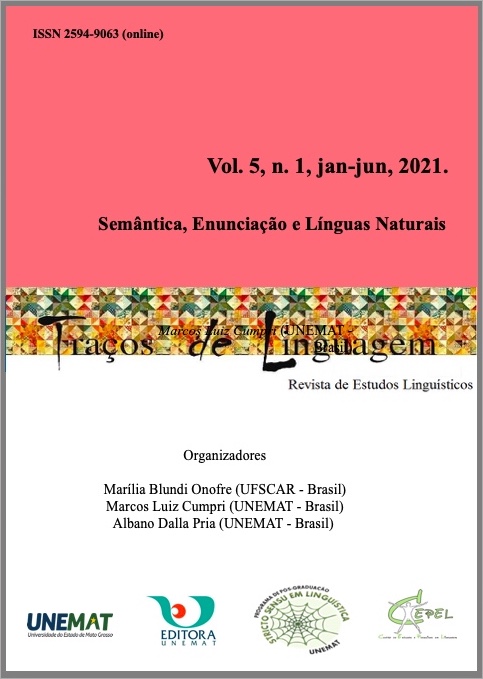Enunciative operations in textual interpretation: reflections on the notion of AMAR
DOI:
https://doi.org/10.30681/2594.9063.2021v5n1id5996Keywords:
enunciative operations, notion, textual interpretation, lexiconAbstract
This article aims to reflect about the work with textual interpretation and the language realized in the classroom, having the notion “love” as its starter. The notions are captured through words, but they do not correspond to a lexicon in a determined language. However, we apprehend the notions through specific languages and, therefore, it is always through lexicon, i.e., through enunciative operations. As it is related to questions which involve teaching, it is important to highlight the significance of reflecting about some of the bases of the Theory of Predicative and Enunciative Operations – TPEO – from the linguist Antoine Culioli. Although the Culiolinian Theory has not been exclusively interested in teaching, it contributes to the development of the language activity, providing the students’ linguistic-cognitive development, who build the notional domain and with their creativity, pondering about their own language. The choice of using the Enunciative Theory is justified by the fact that we consider it a theoretical reference which is fundamental to the language teaching-learning development and, consequently, to the students’ linguistic-cognitive development.
Downloads
References
CULIOLI, A. Notes du Seminaire de D.E.A. Université de Paris 7 – 1983-1984. Départament de recherches linguistiques (D.R.L), 1985. P.1-46.
___________. Pour une linguistique de l’ énonciation. Tome 1, Paris: Ophrys, 1990.
___________. Pour une linguistique de l’ énonciation. Tome 2, Paris: Ophrys, 1999a.
___________. Pour une linguistique de l’ énonciation. Tome 3, Paris: Ophrys, 1999b.
___________. Pour une linguistique de l’énonciation. Tome IV – Tours e Détours. Édition préparée por Rémi Camus – Limoges, Lambert-Lucas, 2018.
DANZA, H. C; DA SILVA, M. A. M. Projeto de vida: construindo o futuro. São Paulo: Editora Ática, 2020.
DE VOGÜE, S. Calcul des valeurs d’un énoncé au présent. Travaux de linguistique 40. Bruxelles, Duculot, p. 1-54, 2000.
DE VOGUÉ, S.; FRANCKEL, J-J; PAILLARD, D (org.). Linguagem e enunciação: representação, referenciação e regulação. São Paulo: Contexto, 2011.
SILVA, R. P. Programa paulista inova educação (2020): o mercado adentrando a escola. Brazilian Journal of Development, v. 7, n.3, p. 23348-23367, 2021.
VALENTIM, H. T. Predicação de existência e operações enunciativas. Lisboa: Edições Colibri, 1998.
VIGNAUX, G. Le discours acteur du monde: énonciation, argumentation et cognition. Paris: Ophrys, 1988.
Downloads
Published
Issue
Section
License
Copyright (c) 2021 Traços de Linguagem - Revista de Estudos Linguísticos

This work is licensed under a Creative Commons Attribution-NonCommercial-ShareAlike 4.0 International License.

